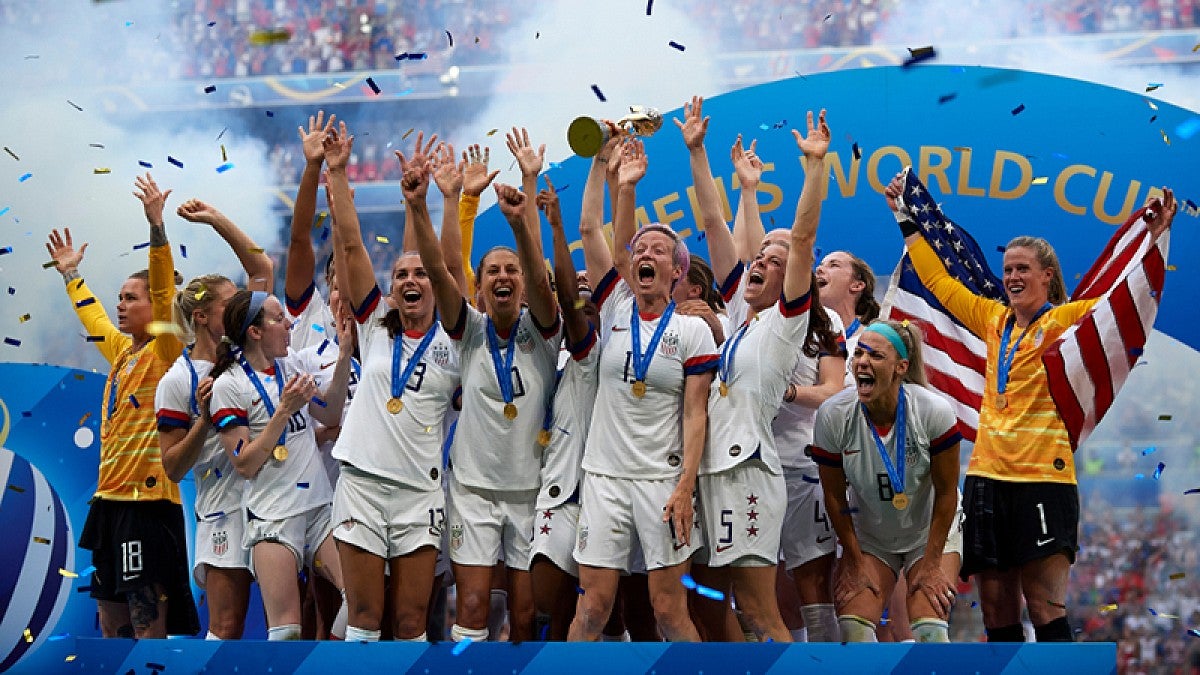With the ninth edition of the FIFA Women’s World Cup now underway in New Zealand and Australia, the U.S. Women’s National Team is favored to win its third consecutive title — something no team, male or female, has ever done in the World Cup.
The U.S. Women’s National Team has won half of all the World Cups that have been played, and they have won or medaled in every World Cup and Olympic Games tournament except one. Another title would put them on par with Brazil in the men’s game as the only teams to win five World Cups.
In other words, the team is the dominant force in women’s soccer. That on-field success in turn has fueled the team’s social activism and made the players an integral part of several sports diplomacy initiatives of the U.S. State Department, said Yoav Dubinsky, instructor of sports business in the UO’s Lundquist College of Business.

Dubinsky recently published a book, “Nation Branding and Sports Diplomacy: Country Image Games in Times of Change,” which includes a chapter on American sports diplomacy in the wake of Title IX, the 1972 law guaranteeing women the same opportunities as men in college sports regardless of whether their sport generates revenue.
The women’s team’s success, and especially its triumph in the 1999 World Cup at the Rose Bowl, has created a succession of iconic athletes from Mia Hamm and Brandi Chastain through Amby Wambach, Carli Lloyd, Megan Rapinoe and Alex Morgan to Sophia Smith and Trinity Rodman, “each standing on the shoulders of giants” and fighting for equality, he said.
“The U.S. State Department recognizes … the positive impact that American sport is doing and uses the players from this team, or historic players, to promote the American lifestyle and American values through different types of programs,” Dubinsky said. “It’s not just soccer. U.S. sports diplomacy has quite a few programs that use female athletes as cultural ambassadors or female influencers to teach about American sports, especially through the lens of gender.”
Examples include the Global Sports Mentoring Program, which invites international leaders to visit the United States to be exposed to the American lifestyle, meet executive leaders and receive mentorship for promoting gender equality.
Another is the Sports Envoy Program, in which the State Department sends American athletes abroad as cultural ambassadors. Alumni of the program include top women’s national team players, including Brandi Chastain, who scored the winning penalty in the 1999 FIFA Women’s World Cup final, and Alex Morgan, the current co-captain of the national team.
Dubinsky said much of the team’s success can be attributed to Title IX, which confers advantages other countries don’t have.
“In comparison to their opponents, the U.S. are the privileged team,” he said. “They enjoy the benefits of Title IX and the level of training and facilities that universities are required to provide to balance with the dozens of scholarships and top facilities level of their competitive, revenue-generating college football programs.”
The U.S. women also make more money than players from other countries because of their labor agreement with the U.S. Soccer Federation. But to maintain their status, they must prove their open-market value, which at times also creates backlash.
While the women’s national team is hugely popular in the United States, players have been criticized internationally for being arrogant or smug, or even being bullies, as when they beat Thailand 13-0 in 2019 — the most lopsided score in World Cup history, men’s or women’s — and celebrating wildly after each goal even as their lead reached double digits.
Dubinsky said the team has put itself in a position where they expect to win.
“This is where the arrogance comes from,” he said. “They’re trying to capitalize on their success to American audiences, and their success depends on improving their market value, especially TV ratings. So they have to communicate to American audiences they are going to win. If the American audience thinks USWNT won’t win, they won’t watch, and TV ratings are lower, which means their demands for better payment are weakened.”
All that success helps the State Department leverage the American lifestyle and promote the message that American women can be successful in any field, including in sports, and in fighting for a better world and more equality, he said.
“The U.S. State Department sees a lot of value in that, although quite a lot of the protests of the USWNT are against American policy,” he said. “There’s a catch there, but overall, the U.S. State Department views the U.S. women’s national team as very good for the reputation of the United States.”
—By Tim Christie, University Communications


